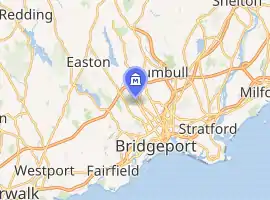Discovery Museum and Planetarium
The Discovery Museum and Planetarium is a hands-on science museum in Bridgeport, Connecticut, that serves as both a tourist destination and an educational resource for area schools. The Discovery Museum provides dynamic, hands-on STEM experiences designed to resonate with the innate curiosity, learning desire, and spirit of exploration of visitors, encouraging young learners to ask questions, solve problems, and engineer solutions today so they are better prepared to embrace the challenges of tomorrow.
 | |

| |
| Established | 1958 |
|---|---|
| Location | 4450 Park Avenue, Bridgeport, Connecticut |
| Type | Art, Science and Industry |
| Visitors | 63,000 (annual) |
| Owner | Board of Trustees[1] |
| Website | http://www.discoverymuseum.org/ |
| Executive Director | Bill Finch[1] |
| Board Chairman | Tom Vos[1] |
The Discovery Museum was founded in 1958 and opened to the public in 1962. Its mission is to inspire wonder and ignite creativity through the exploration of science, technology, engineering and mathematics (STEM) through interactive experiences, unique exhibits, and dynamic STEM learning programs. The museum seeks to enhance public understanding of STEM through a variety of resources including education programs, planetarium presentations, the Challenger Learning Center, Science on a Sphere and a variety of permanent and traveling exhibits. It is southern Connecticut’s preeminent non-profit educational resource for STEM learning and space education.
The museum is located at 4450 Park Avenue, Bridgeport, CT, one mile south of Merritt Parkway (CT Route 15) Exit 47, directly across from the Fairchild Wheeler Golf Course, and just south of the main entrance to Sacred Heart University's campus.
STEM Learning Programs
Discovery Museum offers hands-on STEM Learning Programs including over 80 Educational Programs[2] for school field trips, scout troops, and special events. The Museum's Education staff can customize a package to align with curriculum goals. Discovery Museum runs 8 weeks of Summer STEM Programs [3] for young learners in grades K-9 with new topics featured each week. Special weekend events are offered throughout the year on topics such as Aeronautics, Space Exploration, Earth Science, and Engineering. These special events feature activities offered by Museum staff and partners including local universities, businesses and manufacturers, local STEM professionals, and more.
Challenger Learning Center
The Challenger Learning Center is part of a global network of Challenger Learning Centers use space-themed simulated learning and role-playing strategies to help students bring their classroom studies to life and cultivate skills needed for future success, such as problem solving, critical thinking, communication and teamwork. One of 48 locations globally, [4] The Discovery Museum is home to Connecticut's only Challenger Learning Center.[5]
Henry B. duPont III Planetarium
The Museum's Planetarium features a 33 feet (10 m) domed ceiling, seats up to 90 people and was most recently upgraded in 2015. Presentations are made with a digital video display unit, and a central Spitz 512 Planetarium Projector that is capable of displaying over 2500 stars. Stereo sound is provided by an array of four JBL studio monitors suspended above the dome, complemented with speakers built into the theater's walls.[6]
Science on a Sphere
The lower level of the Museum features Science On a Sphere (SOS). SOS is a room-sized, global display system that uses computers and video projectors to display planetary data on a six-foot diameter animated globe. This engaging exhibit opened in early 2016 at Discovery Museum’s annual Space Day event, and is available to guests and groups with hundreds of data sets available for viewing. Developed by researchers at National Oceanic and Atmospheric Administration (NOAA) as an educational tool that illustrates Earth System science, SOS transforms real-time data from our Earth and other planets into graphic representations with stunning detail and accuracy.